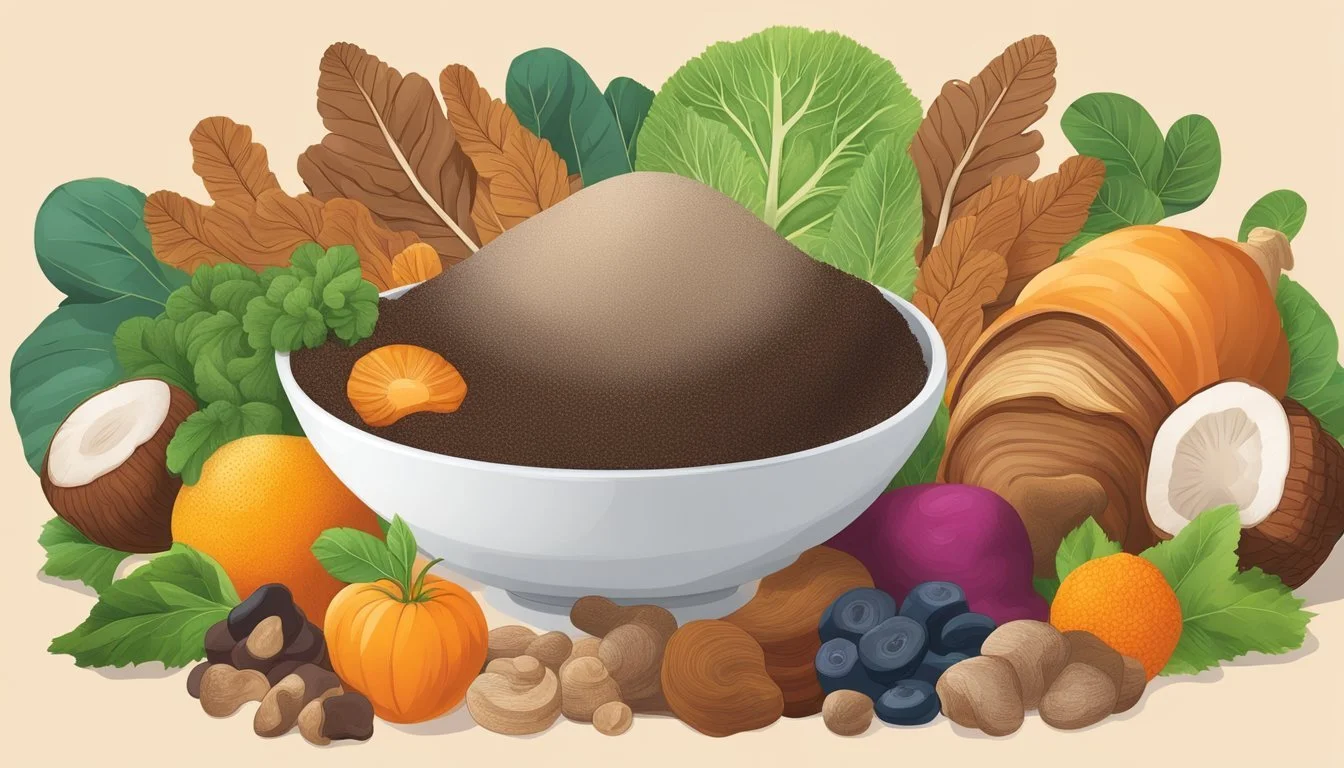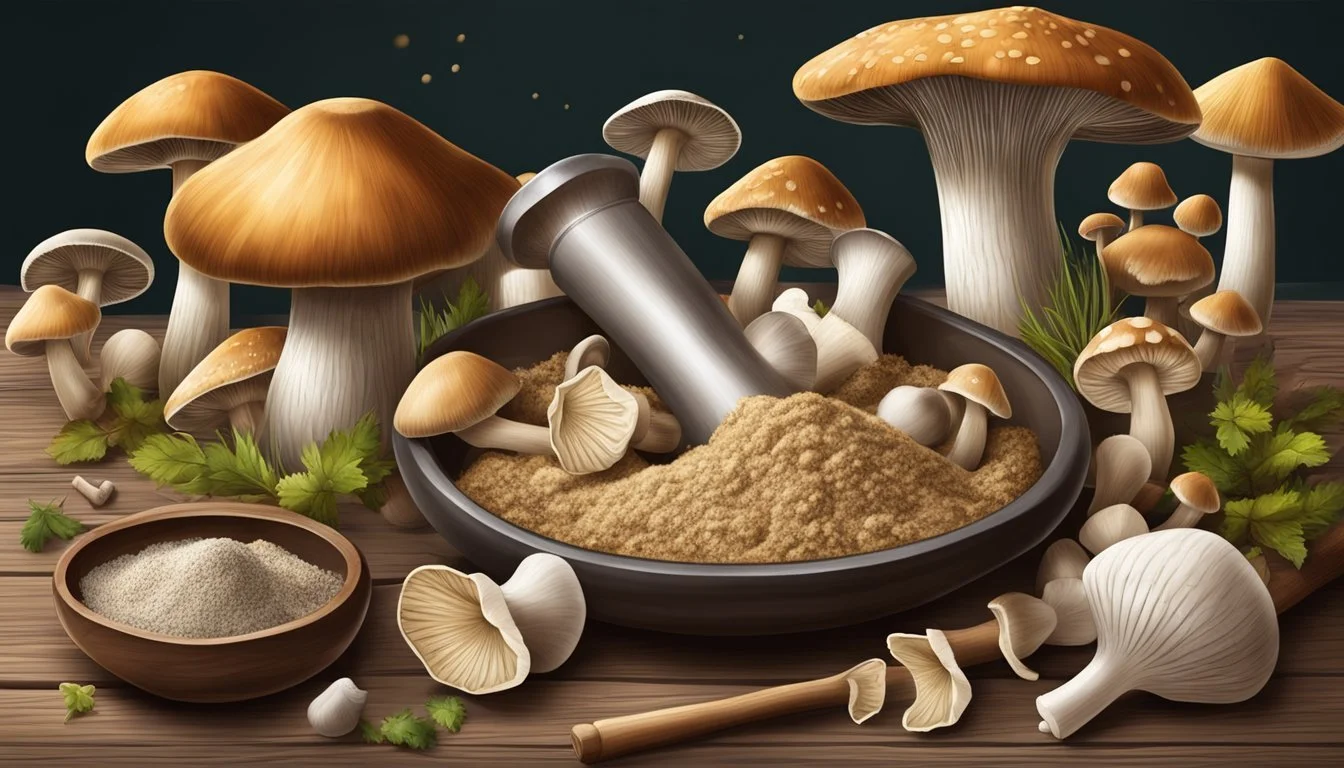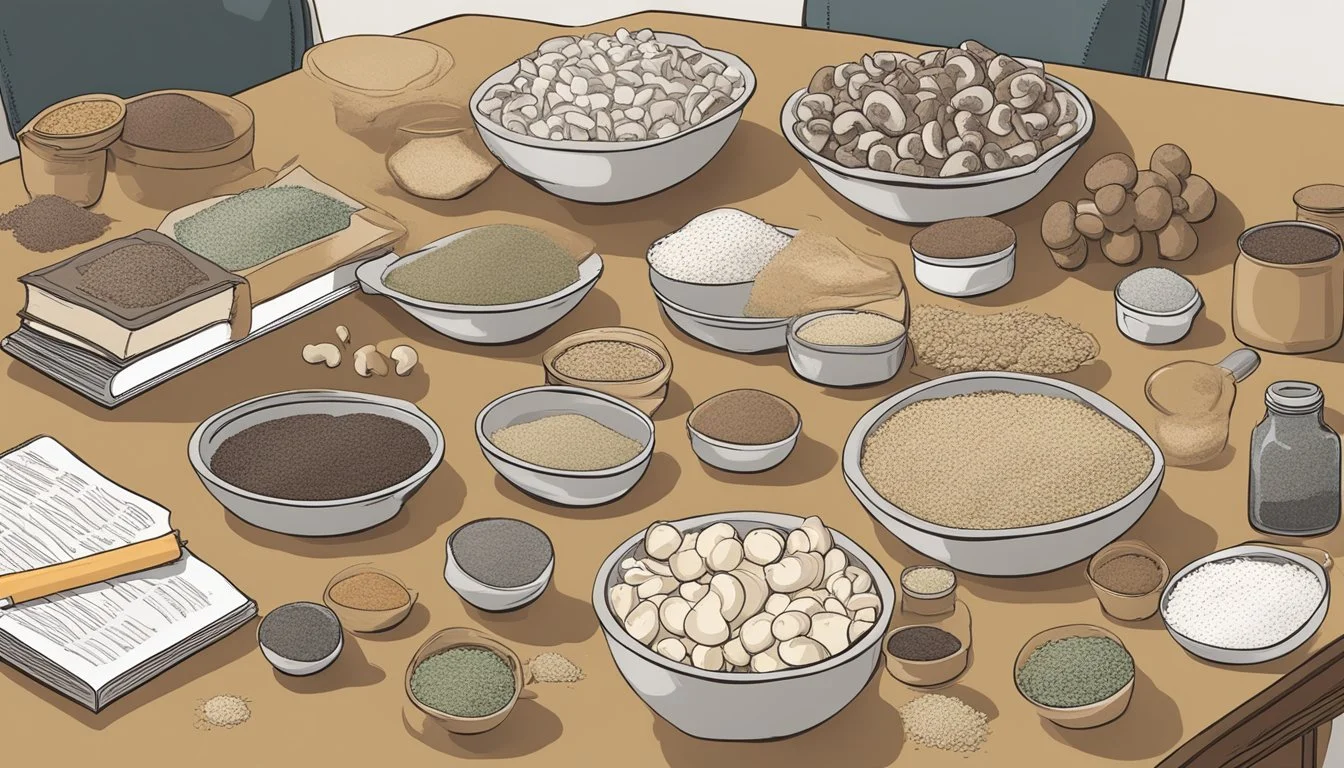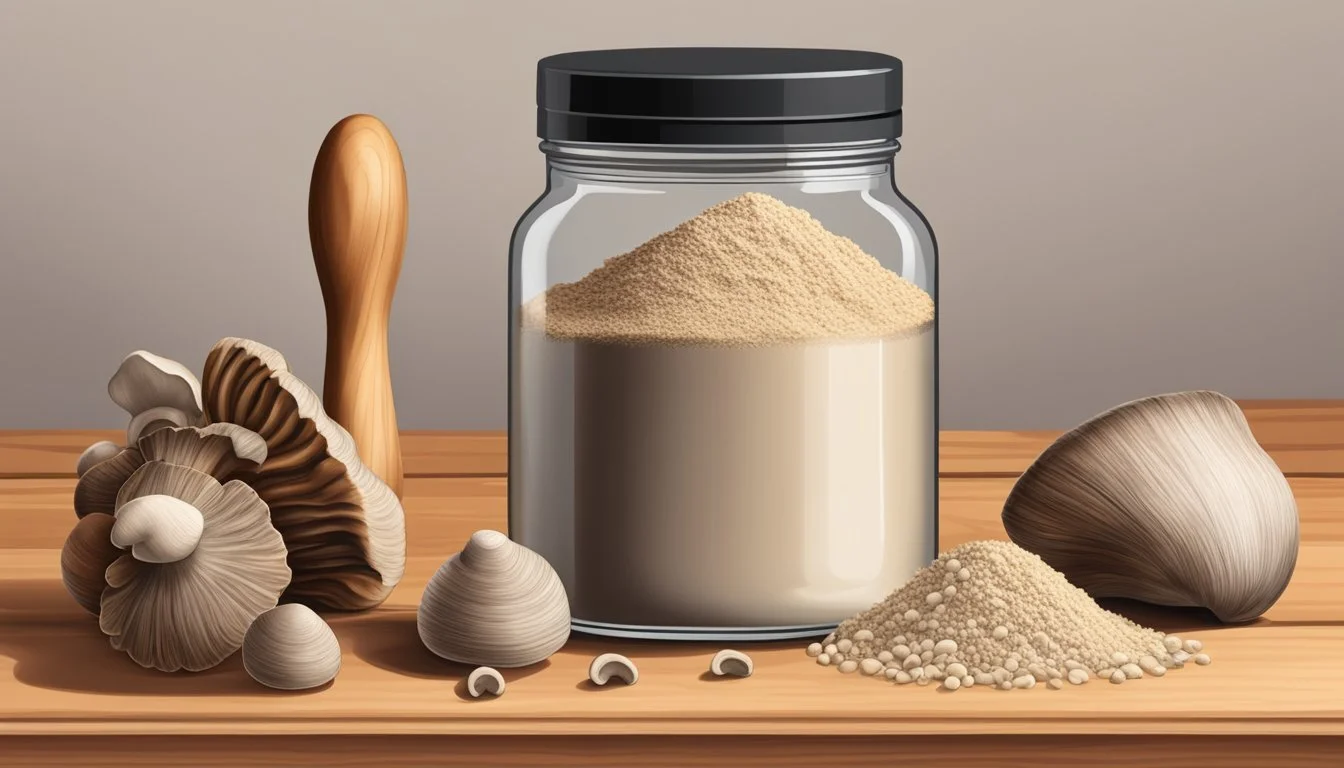Turkey Tail Mushroom Powder Substitutes
Top Alternatives for Optimal Health
When it comes to finding a substitute for turkey tail mushroom powder, there are several other mushroom powders and supplements that can be just as effective in providing similar health benefits. Turkey tail mushroom powder is praised for its immune-boosting properties and its potential to improve gut health, among other advantages. But what if you can't find it or prefer a different option?
For those looking for alternatives, reishi and chaga mushroom powders stand out as excellent options. Both offer their unique sets of benefits that may complement or even enhance your dietary needs. Reishi is known for its stress-relieving properties, while chaga boasts powerful antioxidants and has been linked to improved skin health.
If you're concerned about the specific benefits of turkey tail, like its anti-inflammatory and immune-enhancing effects, you might also consider shiitake mushroom powder. This option provides valuable nutrients such as copper and vitamin B5, and it may also help in lowering cholesterol and fighting inflammation.
Understanding Turkey Tail Mushrooms
Turkey tail mushrooms, known scientifically as Trametes versicolor or Coriolus versicolor, are widely recognized for their distinct appearance and numerous health benefits. These mushrooms have a historical and scientific significance that highlights their role in both traditional and modern medicinal practices.
Historical Significance
Turkey tail mushrooms have been used for centuries in traditional Chinese medicine. They were valued for their ability to support the immune system and boost overall health. Ancient practitioners utilized these fungi to create teas, powders, and tinctures.
In Japan, turkey tail mushrooms, known as "kawaratake," have been incorporated into traditional healing practices. The historical use of turkey tail mushrooms in these cultures speaks to their long-standing reputation as therapeutic agents.
Scientific Overview
Scientifically, turkey tail mushrooms are prized for their rich composition of beneficial compounds. They contain polysaccharides, particularly beta-glucans, known for their immune-boosting properties. These compounds stimulate the immune system and act as antioxidants.
Research has demonstrated the potential of turkey tail mushrooms in enhancing immunity. Modern studies continue to explore their efficacy in supporting health. The presence of beta-glucans and other polysaccharides in turkey tail mushrooms contributes significantly to their value as medicinal mushrooms.
Health and Nutritional Benefits
Turkey tail mushrooms offer numerous health and nutritional benefits due to their rich composition of bioactive compounds. These mushrooms are known for supporting the immune system, improving gut health, and their potential role in cancer treatment, among other advantages.
Immune System Support
Turkey tail mushrooms are renowned for their ability to modulate immune function. Beta-glucans found in these mushrooms stimulate immune cell activity and enhance the body's defense against infections and diseases. Polysaccharide-K (PSK) and Polysaccharide-P (PSP) are prominent compounds in turkey tail that support immune response. Regular consumption of these mushrooms may contribute to reduced inflammation, thus supporting overall health.
Gut Health and Prebiotics
Consuming turkey tail mushrooms can promote gut health due to their prebiotic properties. They foster the growth of beneficial bacteria in the gut microbiome, aiding digestion and improving overall gut health. This medicinal mushroom's polysaccharides act as a food source for these bacteria, which can help in maintaining a balanced gut environment and prevent digestive disorders.
Potential in Cancer Treatment
Turkey tail mushrooms have shown potential in supporting cancer treatment. PSK, a bioactive compound, has been studied for its ability to enhance the effects of chemotherapy, particularly in breast cancer treatment. PSK and PSP may also help reduce the spread of cancer cells, bolster the immune system, and improve patient outcomes. Although research is ongoing, these findings highlight the promising role of turkey tail mushrooms in complementary cancer therapy.
Additional Health Advantages
Beyond immune support and gut health, turkey tail mushrooms offer other health benefits. They contain various antioxidants which help reduce oxidative stress and protect cells from damage. Regular intake may also aid in managing blood sugar levels, contributing to metabolic health. Furthermore, their anti-viral and anti-bacterial properties can help in reducing infections, enhancing overall well-being.
Turkey Tail Mushroom Powder Uses
Turkey tail mushroom powder is versatile, enhancing both nutritional dishes and holistic health practices. It offers unique benefits when integrated thoughtfully into daily routines.
Incorporating into Diet
Turkey tail mushroom powder can be easily added to various recipes. Many prefer smoothies for a simple way to enjoy its potential health benefits. Just a teaspoon in your morning blend can boost your diet with essential nutrients.
Tea is another popular method, offering a calming ritual. To make it at home, add the powder to boiling water, let it steep, and enjoy. The tea can help in boosting immunity and balancing the body's energy levels.
For those who enjoy cooking, turkey tail mushroom powder can be sprinkled into soups, stews, or even baked goods. Its subtle taste allows it to blend well without overpowering other flavors, providing an easy method to augment meals with its potential benefits.
Complementary Medicine
In traditional Chinese medicine (TCM), turkey tail mushroom, known as yun zhi, is valued for its ability to support both underactive and overactive immune systems. This unique property makes it a valuable component in TCM practices aiming to balance bodily functions.
Healthcare professionals sometimes suggest turkey tail powder as an adjuvant therapy. This means it complements conventional treatments by potentially improving their outcomes. It has been noted for its role in enhancing gut health by supporting the growth of beneficial bacteria.
As a supplement, it is often used to help in reducing inflammation and managing blood sugar levels, particularly in people with type 2 diabetes. Its polysaccharides act as prebiotics, feeding the good bacteria in the digestive system, which is essential for overall gut health.
Finding Substitutes for Turkey Tail Powder
Turkey tail mushroom powder is popular due to its health benefits, including immune support and gut health. There are viable alternatives, from other supplements to homemade options and different mushroom variants, each offering unique advantages.
Alternative Supplements
Several supplements can replace turkey tail powder. Reishi and cordyceps mushrooms are notable examples.
Reishi is praised for its immunomodulatory properties. It can enhance immune function, providing similar benefits to turkey tail mushrooms. Cordyceps are known for boosting energy and stamina, making them appealing for athletes. These supplements are available in various forms like powders, capsules, and tinctures, making them convenient to incorporate into daily routines.
Homemade Alternatives
Turkey tail powder can be prepared at home using traditional drying and grinding techniques. Start by cleaning and slicing the mushrooms. Use a dehydrator set to 115°F for 12-24 hours or air-dry them until brittle.
Once dried, grind them into a fine powder using a coffee grinder or food processor. Homemade tinctures are also an option, involving soaking dried mushrooms in a high-proof alcohol solution to extract beneficial compounds. These methods ensure the product's purity and potency.
Other Mushroom Variants
In addition to reishi and cordyceps, mushrooms like shiitake and maitake are potent substitutes. Shiitake mushrooms contain compounds that may prevent cancer and inflammation. They also provide important vitamins such as B5 and D.
Maitake mushrooms are rich in polysaccharides, which can support immune health and regulate blood sugar levels. These functional mushrooms can be found in powder form, allowing for easy integration into various dishes or drinks. Each mushroom variant offers a unique profile of nutrients and potential health benefits.
Safety and Side Effects
Turkey tail mushroom powder, while beneficial for supporting immune function and improving gut health, may have side effects and requires careful dosage considerations. Special populations, such as pregnant and breastfeeding individuals, should be extra cautious.
Common Side Effects
Turkey tail mushrooms are generally well-tolerated by most individuals. Common side effects can include mild digestive issues such as gas, bloating, or a dry mouth. Some users have reported experiencing an upset stomach, particularly when first incorporating the powder into their diet.
In rare cases, allergic reactions might occur. Symptoms could include skin rashes or itching. People with preexisting conditions should consult with a healthcare provider before using turkey tail products to avoid adverse effects.
Dosage Considerations
The appropriate dosage of turkey tail mushroom powder can vary based on factors such as age, health status, and the specific condition being treated. Generally, 2-3 grams per day is considered a safe and effective amount for adults, either in powder or capsule form.
Overconsumption can lead to digestive discomfort or other side effects. Consistent, moderate use is key to obtaining the benefits without the drawbacks. It’s advisable to begin with a lower dose and gradually increase it, monitoring for any side effects.
Special Populations
Pregnant and breastfeeding individuals should exercise caution with turkey tail mushroom powder. There is limited research on its safety in these groups. It's best to consult a healthcare provider to weigh the potential benefits and risks.
People with autoimmune conditions or those undergoing chemotherapy should discuss usage with their doctors. Turkey tail’s effects on the immune system might interact with treatments. Additionally, its potential to lower blood sugar levels requires careful monitoring for individuals with diabetes to avoid hypoglycemia.
Research and Studies
Research into turkey tail mushroom powder substitutes is extensive, covering various clinical trials, mechanisms of action, and future research directions. Key studies emphasize the immune-boosting properties and potential benefits for cancer patients.
Clinical Trials and Human Studies
Clinical trials have shown that polysaccharide krestin (PSK), a component found in turkey tail mushrooms, has notable immune-modulating effects. In Japan, PSK has been used for over 30 years in cancer treatment.
Human trials have demonstrated that PSK can improve survival rates for some cancers. Studies also highlight the benefits of protein-bound polysaccharides like beta-glucans in enhancing immune function. Other bioactive compounds, such as quercetin, are being investigated for their potential to improve cognitive function and athletic performance.
Mechanisms of Action
Turkey tail mushrooms have several mechanisms of action primarily involving bioactive compounds like PSK and beta-glucans. These compounds stimulate the immune system by enhancing the activity of natural killer cells and T-cells.
Polysaccharide-K is particularly well-documented for its ability to strengthen the immune system. Protein-bound polysaccharides interact with gut microbiota, promoting a healthy immune response. Quercetin has shown antioxidant properties, contributing to overall health and potentially aiding exercise performance.
Future Research Directions
Future research will likely focus on further understanding the precise mechanisms by which turkey tail mushroom powder and its substitutes achieve their effects.
Researchers are particularly interested in new human trials to validate these properties over more extended periods and varied populations. There's also growing interest in exploring cognitive function enhancements and the potential benefits for athletic performance. Expanding studies into broader applications, including the synergistic effects of these compounds with other treatments, is essential.
Practical Tips and Considerations
Understanding the best practices for purchasing, storing, and preparing turkey tail mushroom substitutes can help maximize their health benefits and ensure their effectiveness.
Purchasing and Storage
When purchasing turkey tail mushroom substitutes, consider options like mycelium-based products, fruiting bodies, or turkey tail supplements. Look for products that are certified organic and free from fillers.
Turkey tail fungi should be stored in a cool, dry place. Airtight containers can prevent moisture and contamination. For powdered forms, keep them sealed tightly to maintain potency.
Making Turkey Tail Preparations at Home
Creating homemade preparations from turkey tail mushrooms can be a rewarding process. To make a tincture, combine an alcohol base with dried turkey tail mushrooms. For tea, simmer the dried mushrooms in water for an hour.
A simple method to create mushroom powder involves drying the mushrooms at 115°F and grinding them into fine powder once fully dried. Ensure all tools and surfaces are clean to avoid contamination.
Maximizing Health Benefits
Turkey tail fungus is known for its immune system support and gut health benefits. To get the most out of turkey tail supplements or preparations, consume them consistently.
Combine turkey tail products with a balanced diet rich in fiber and nutrients. Tinctures offer concentrated benefits, while powders can be easily added to daily meals for routine intake.
Incorporate turkey tail oil in cooking or herbal mixes to leverage its antioxidant properties. Proper adherence to these considerations will enhance both the utility and effectiveness of turkey tail mushroom substitutes.
Conclusion
Incorporating substitutes for turkey tail mushroom powder can offer diverse benefits.
Alternatives like reishi, lion's mane, maitake, and shiitake mushrooms are popular choices due to their potential health advantages.
These mushrooms contain important compounds that support the immune system and boost antioxidant levels.
Nutritionally, other medicinal mushrooms provide similar benefits. Substitutes often offer vitamins, minerals, and adaptogens.
Flavor considerations are essential when choosing a substitute. For instance, combinations such as mushroom powders with cacao, coconut milk powder, or spices can add a unique twist to recipes.










